Module 2 Unit 5 The human brain Period 2 Words 词汇拓展延伸 牛津上海版九年级英语上册 (共20张PPT)
文档属性
| 名称 | Module 2 Unit 5 The human brain Period 2 Words 词汇拓展延伸 牛津上海版九年级英语上册 (共20张PPT) |
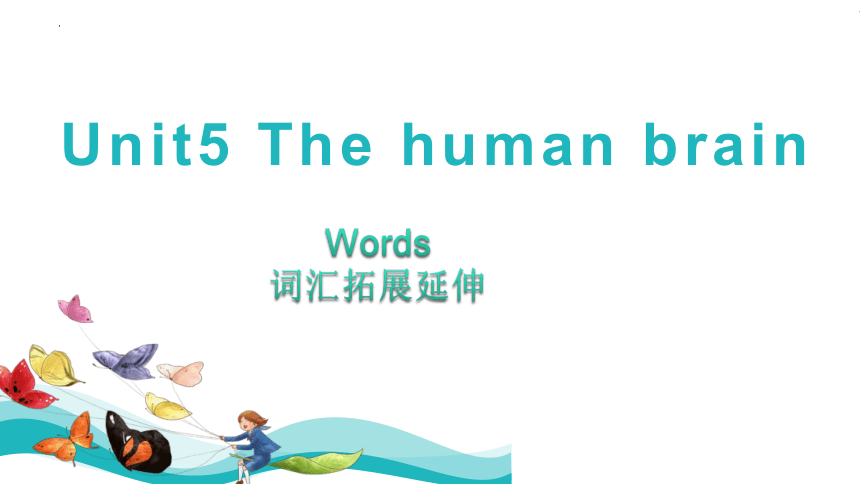
|
|
| 格式 | pptx | ||
| 文件大小 | 721.9KB | ||
| 资源类型 | 教案 | ||
| 版本资源 | 牛津上海版(试用本) | ||
| 科目 | 英语 | ||
| 更新时间 | 2023-09-23 15:16:07 | ||
图片预览

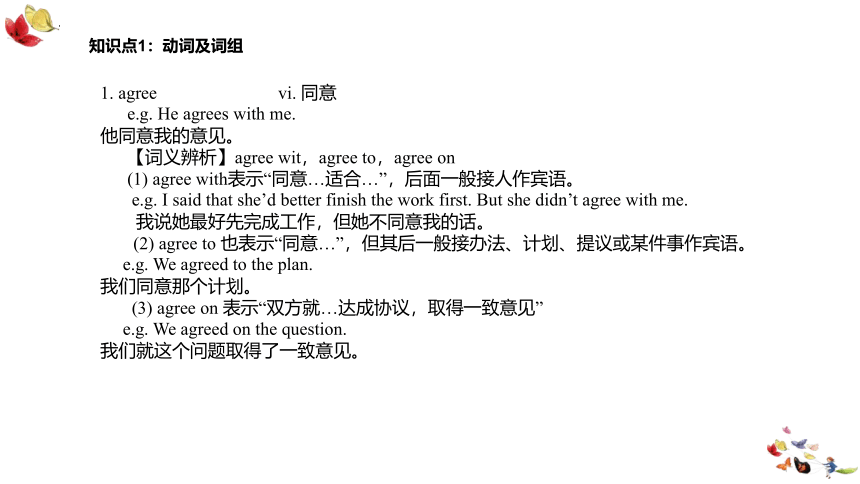
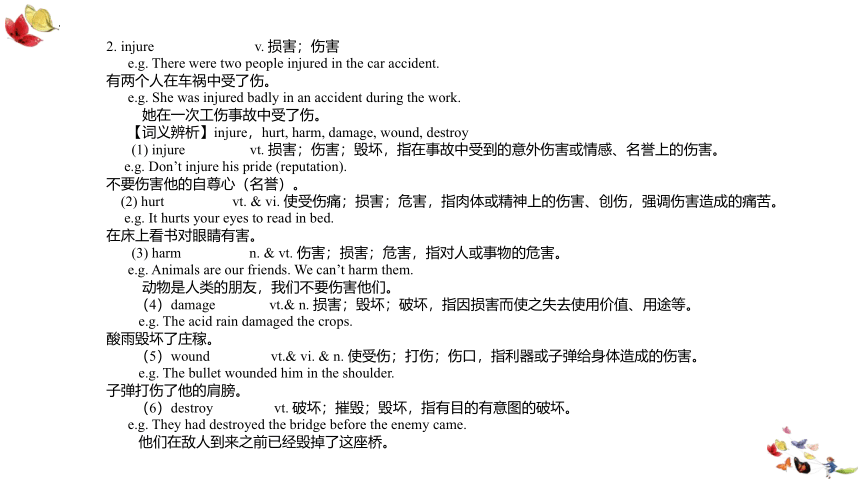
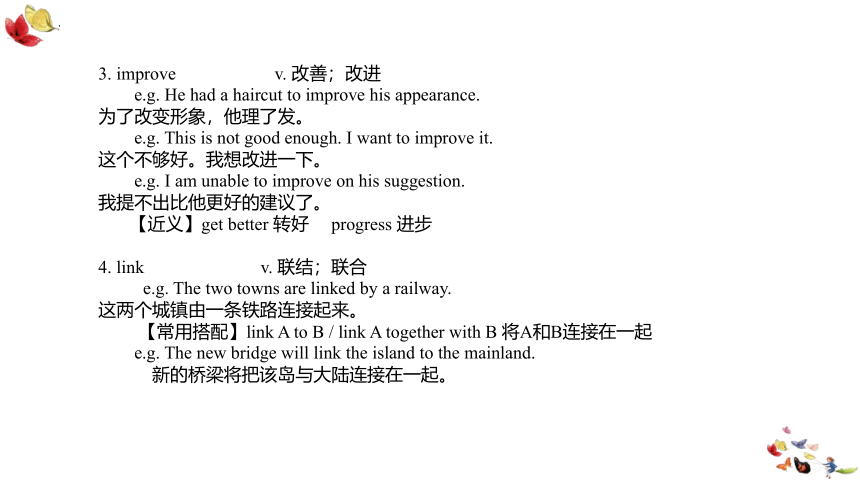

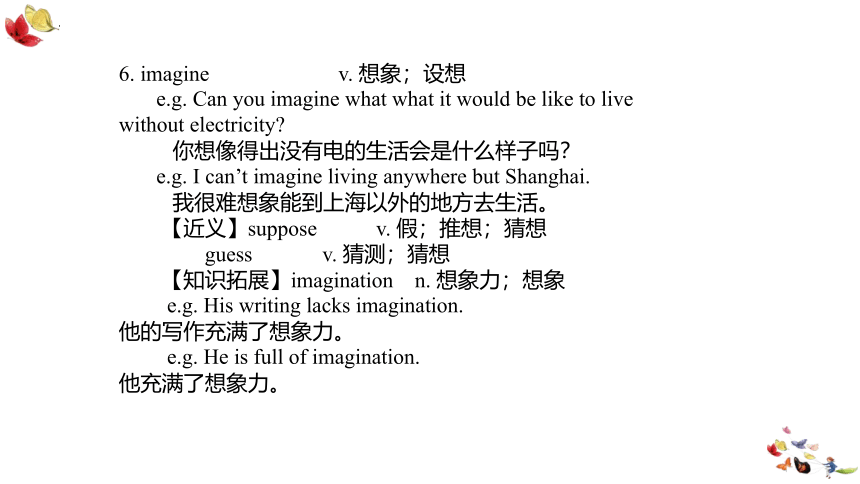
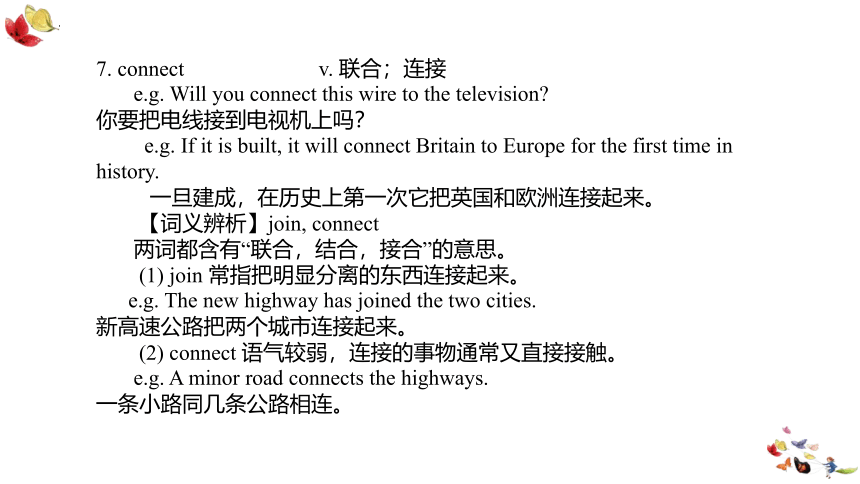
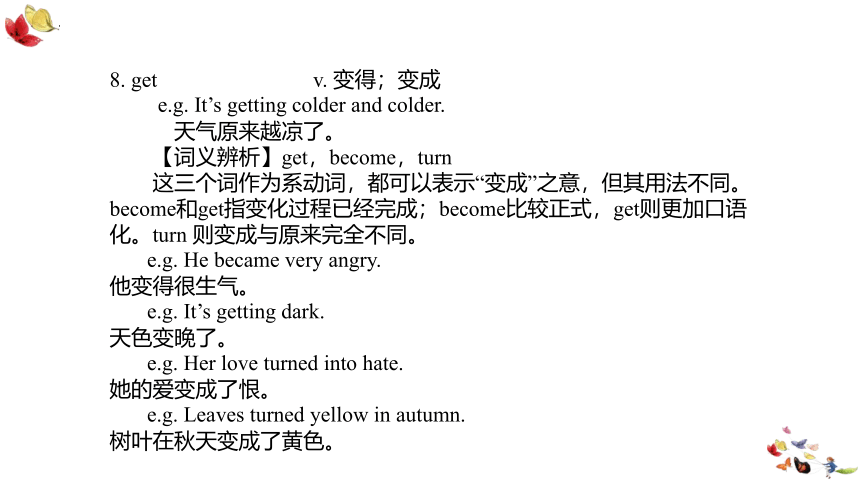

文档简介
(共20张PPT)
Words
词汇拓展延伸
Unit5 The human brain
知识点1:动词及词组
1. agree vi. 同意
e.g. He agrees with me.
他同意我的意见。
【词义辨析】agree wit,agree to,agree on
(1) agree with表示“同意…适合…”,后面一般接人作宾语。
e.g. I said that she’d better finish the work first. But she didn’t agree with me.
我说她最好先完成工作,但她不同意我的话。
(2) agree to 也表示“同意…”,但其后一般接办法、计划、提议或某件事作宾语。
e.g. We agreed to the plan.
我们同意那个计划。
(3) agree on 表示“双方就…达成协议,取得一致意见”
e.g. We agreed on the question.
我们就这个问题取得了一致意见。
2. injure v. 损害;伤害
e.g. There were two people injured in the car accident.
有两个人在车祸中受了伤。
e.g. She was injured badly in an accident during the work.
她在一次工伤事故中受了伤。
【词义辨析】injure,hurt, harm, damage, wound, destroy
(1) injure vt. 损害;伤害;毁坏,指在事故中受到的意外伤害或情感、名誉上的伤害。
e.g. Don’t injure his pride (reputation).
不要伤害他的自尊心(名誉)。
(2) hurt vt. & vi. 使受伤痛;损害;危害,指肉体或精神上的伤害、创伤,强调伤害造成的痛苦。
e.g. It hurts your eyes to read in bed.
在床上看书对眼睛有害。
(3) harm n. & vt. 伤害;损害;危害,指对人或事物的危害。
e.g. Animals are our friends. We can’t harm them.
动物是人类的朋友,我们不要伤害他们。
(4)damage vt.& n. 损害;毁坏;破坏,指因损害而使之失去使用价值、用途等。
e.g. The acid rain damaged the crops.
酸雨毁坏了庄稼。
(5)wound vt.& vi. & n. 使受伤;打伤;伤口,指利器或子弹给身体造成的伤害。
e.g. The bullet wounded him in the shoulder.
子弹打伤了他的肩膀。
(6)destroy vt. 破坏;摧毁;毁坏,指有目的有意图的破坏。
e.g. They had destroyed the bridge before the enemy came.
他们在敌人到来之前已经毁掉了这座桥。
3. improve v. 改善;改进
e.g. He had a haircut to improve his appearance.
为了改变形象,他理了发。
e.g. This is not good enough. I want to improve it.
这个不够好。我想改进一下。
e.g. I am unable to improve on his suggestion.
我提不出比他更好的建议了。
【近义】get better 转好 progress 进步
4. link v. 联结;联合
e.g. The two towns are linked by a railway.
这两个城镇由一条铁路连接起来。
【常用搭配】link A to B / link A together with B 将A和B连接在一起
e.g. The new bridge will link the island to the mainland.
新的桥梁将把该岛与大陆连接在一起。
5. memorize v. 记住;记忆
e.g. He memorized the list of dates, but neglected the main facts corresponding to them.
他记住了那一系列日期,却忽略了与其有关的主要事实。
【词义辨析】memorize,remember
(1) memorize 指的是“记住,熟记”,是将原本无记忆的东西通过某种手段而化作记忆。
e.g. Memorize these words and you will have a dictation tomorrow.
记住这些单词,你们明天将有一次听写。
(2) remember 指的是“回忆,记起”,是将原来记忆中的东西挖掘出来。
e.g. Can you remember what happened yesterday
你能记得昨天发生了什么吗?
6. imagine v. 想象;设想
e.g. Can you imagine what what it would be like to live without electricity
你想像得出没有电的生活会是什么样子吗?
e.g. I can’t imagine living anywhere but Shanghai.
我很难想象能到上海以外的地方去生活。
【近义】suppose v. 假;推想;猜想
guess v. 猜测;猜想
【知识拓展】imagination n. 想象力;想象
e.g. His writing lacks imagination.
他的写作充满了想象力。
e.g. He is full of imagination.
他充满了想象力。
7. connect v. 联合;连接
e.g. Will you connect this wire to the television
你要把电线接到电视机上吗?
e.g. If it is built, it will connect Britain to Europe for the first time in history.
一旦建成,在历史上第一次它把英国和欧洲连接起来。
【词义辨析】join, connect
两词都含有“联合,结合,接合”的意思。
(1) join 常指把明显分离的东西连接起来。
e.g. The new highway has joined the two cities.
新高速公路把两个城市连接起来。
(2) connect 语气较弱,连接的事物通常又直接接触。
e.g. A minor road connects the highways.
一条小路同几条公路相连。
8. get v. 变得;变成
e.g. It’s getting colder and colder.
天气原来越凉了。
【词义辨析】get,become,turn
这三个词作为系动词,都可以表示“变成”之意,但其用法不同。become和get指变化过程已经完成;become比较正式,get则更加口语化。turn 则变成与原来完全不同。
e.g. He became very angry.
他变得很生气。
e.g. It’s getting dark.
天色变晚了。
e.g. Her love turned into hate.
她的爱变成了恨。
e.g. Leaves turned yellow in autumn.
树叶在秋天变成了黄色。
1.basic adj. 基本的
basic data 基本数据 basic industry 基础工业
e.g. The basic reason why he made so many mistakes in his homework is that he didn’t go over his lessons yesterday.
在他的家庭作业中犯那么多错的根本原因是他昨天没有复习功课。
【近义词】essential adj. 基本的;必需的
【知识拓展】base n. 基础
e.g. She used her family’s history as a base for her novel.
她把一家人的经历作为她小说的素材。
知识点2.形容词或副词
2.afterwards adv. 然后;后来地
e.g. We saw the film and afterwards walked home together.
我们看了电影,然后一起回家了。
e.g. Soon afterwards, the balloon began to descend and it landed near an airfield.
过了一会儿,气球开始降落,并且在一个机场附近着陆了。
【知识拓展】-ward(s) (后缀) (1)构成形容词表示“向…的”;(2)构成副词表示“向”。
forwards 向前 backwards 向后
downwards 向下 upwards 向上
northwards 向北 southwards 向南
3.silly adj. 愚蠢的;傻的
e.g. Don’t be silly, that insect won’t hurt you.
别傻了,那虫子不会伤你的。
e.g. Don’t stand there, you silly ass.
别站在那儿,你这笨蛋!
【近义】foolish adj. 愚蠢的;傻的;笨的
e.g. How foolish they all seem ! 他们看来都那么愚蠢!
【反义】wise adj. 英明的;明智的;聪明的
e.g. My father is a wise man. 我爸爸是一个睿智的男人。
clever adj. 聪明的;机灵的
e.g. Everyone in my school is clever. 我们学校每个人都聪明。
4. colourful adj. 鲜艳的;彩色的;生动的
e.g. a colourful shirt
鲜艳的衬衫
e.g. a colourful story
饶有趣味的故事
e.g. She has a rather colourful past.
她过去的生活多姿多彩。
【知识拓展】colour n. 颜色
e.g. You need more colour in this room.
你这房间的色调需要丰富些。
5.dramatic adj. 戏剧性的;生动的
e.g. The meeting between the mother and her son was dramatic indeed.
母子之间的见面真的很又戏剧性。
e.g. She made a dramatic speech at the meeting.
她在会上发表了激动人心的演说。
【知识拓展】drama n. 戏剧;戏剧艺术
e.g. My grandma prefers dramas to popular songs.
我奶奶喜欢戏剧而不喜欢流行歌。
1.method n. 方法
e.g. The best method of keeping fit is to exercise regularly.
保持健康的做好的方法就是经常锻炼。
【指点迷津】method,way
这两个词都有“方法”或“方式”的意思
(1) method 所表示的“方法”可以指做某件事的具体步骤或程序,也可指抽象概念“条理”。
e.g. To do this, scientists have to devise methods using radar and underwater television.
为此,科学家还要设计出使用雷达和水下电视的方法。
(2) way是个最通用的且不正式的词,可以用来代替method。由于way常出现在许多固定的词组中,可见这是个使用非常频繁的词;在不少含有way的词组中,使用method或manner等可能表意更准确些,但是那样却损害了生动性。
e.g. He always has his own way.
他总是随心所欲。
此句中的way就是manner的意思,因为说的是“个人喜爱的方式方法”。另外do sth in this way 中的way即method的意思,但并不用method。
e.g. In time, all Sam’s money was paid back in this way
最后,山姆的全部钱都是用这种方式付还的。
e.g. The only way to do this was to operate.
要做到这一点的唯一方法就是动手术。
e.g. Civilized men like such a way of living.
文明人喜欢这样的生活方式。
知识点3.名词
2.death n. 死;死亡
e.g. The death of her mother was sudden.
她母亲的死很突然。
e.g. The accident was the death of him.
他因意外事故而死。
【词义辨析】death / die / dead / dying
(1) die v. 死亡
death n. 死亡
e.g. To die for the people is a glorious death!
为人民而死,虽死犹荣。
e.g. A bad driver was responsible for their deaths.
一个失职的司机为他们的死负责。
(2) dead adj. 死亡的;无生命的
e.g. My father has been dead for ten years.
我父亲已经去世10年了。
(3) dying adj. 将死的
e.g .The wounded soldier was dying and said something in a low voice.
这个受伤的士兵奄奄一息,虚弱地说着什么。
Using
1.We were sorry to be absent from the lecture last week. (real)
2.When I was a child, my mum often told me many amazing . (story)
3. is connected with humans’ feelings. (memorize)
4.Unless you go along the river, you (get) lost in the forest.
5.As a student, you should get more and more . (know)
6.I did badly in the exam, but Li Ming did even (badly) than me.
7.She has a rather (colour) past.
8.More and more people get to know the (important) of learning English.
9.I can’t (connect) my computer to the Internet. There must be something wrong.
10.The escalator can bring you to the floor of the mall. (two)
11.The most important thing is to reach an (agree) and to avoid a trade war.
12.Three hundred people in this town are (die) of hunger every day.
13.If you don’t change your method, you will never in losing weight. (success)
14.New (method)of teaching foreign languages are used in this school.
15.Jessica if she could get a ticket for her favourite singer’s concert. (wonderful)
Keys
1.really
【详解】句意:我真的很遗憾缺席上周的演讲。根据空后的“sorry”是形容词,应用副词修饰,real应改成副词形式really“十分,非常”。故填really。
2.stories
【详解】句意:当我还是个孩子的时候,我妈妈经常给我讲许多令人惊叹的故事。根据“many”可知后面需要用可数名词复数,story的复数形式为stories。故填stories。
3.Memory
【详解】句意:记忆与人类的情感有关。根据空后的“is”可知此处应填名词作主语,memorize“记住”是动词,应改为其名词形式memory“记忆”,因其位于句首,所以首字母要大写。故填Memory。
4.will get
【详解】句意:除非你沿着这条河走,否则你会在森林里迷路。该句是unless引导的条件状语从句,遵循“主将从现”,主句要用一般将来时,即will+动词原形。故填will get。
5.knowledge
【详解】句意:作为学生,你应当学到越来越多的知识。空处的词做谓语get的宾语,所以应是名词。动词know对应的名词是knowledge,意为“知识”。故填knowledge。
6.worse
【详解】句意:在考试中我做的很糟糕,但是李明比我更糟糕。根据句中“than”的提示可知,空处的词要用比较级。副词badly的比较级是worse,意为“更糟糕的”。故填worse。
7.colourful
【详解】句意:她过去的生活多姿多彩。根据句意可知,空处的词是修饰名词“past”,所以要用形容词。colour是名词,它对应的形容词是colourful“五彩缤纷的”。故选colourful。
8.importance
【详解】句意:越来越多的人认识到学习英语的重要性。根据“the…(important) of”可知,此处应该填一个名词,important的名词为importance“重要性”。故填importance。
9.connect
【详解】句意:我无法把我的电脑联网。一定出故障了。位于情态动词can’t后作谓语,用动词原形connect。故填connect。
10.second
【详解】句意:自动扶梯可以带你到购物中心的二楼。floor“楼层”单数名词,所以其前应该用序数词, 故填second。
11.agreement
【详解】句意:最重要的是达成协议,避免贸易战。根据an可知,此空应填名词,reach an agreement“达成协议”,故填agreement。
12.dying
【详解】句意:每天,在这个镇上有三百人死于饥饿。根据“are”可知,用现在进行时,dying符合句意;故填dying。
13.succeed
【详解】句意:如果你不改变你的方法,你减肥就永远不会成功。此处填动词原形,与will构成一般将来时;succeed“成功”,动词;故填succeed。
14.methods
【详解】句意:这所学校采用了新的外语教学方法。method“方法”,名词,of前应该用名词,根据“...are used in this school.”可知,此处应该用名词复数。故填methods。
15.wondered
【详解】句意:杰西卡想知道她是否能买到她最喜欢的歌手演唱会的门票。wonderful“精彩的,极好的”,是一个形容词。根据句子结构可知,该空为句子的谓语动词,故这里考查wonder,意为“想知道”。根据语境“…if she could…”可知,该句为一般过去时。故填wondered。
Using
16.—I am going to the party.
—If you do, you (have) a great time.
17.If it (be) fine tomorrow, I’ll go with you.
18.Mrs. Green always thinks herself as the (silly) woman of all. So she never speaks with others.
19.Tom White’s book is sure to be very popular in Hong Kong. (late)
20.The lamp has a heavy .(basic)
21.I wish (get) the first prize in the test.
22.The computer is (connect) to the TV through wires under the floor.
23.It is difficult (imagine) our lives without sun.
24.All the characters in this book are (imagine).
25.She is used to (memorize) new words in the morning.
26.The soldier got some serious (injure) in the war.
27.Yesterday the of traffic accident were taken to Baoshan Hospital at once.(injure)
28.Louise was caught in a car accident and got injured .(serious)
29.—How is your program getting along
—Jack (agree) to help us, but he has changed his mind.
30.A basic way to improve our English is (memory) as many words as we can.
Keys
16.will have
【详解】句意:——我要去参加聚会。——如果你这样做,你会玩得很开心。根据“If you do, you...a great time.”可知,此处是if引导的条件状语从句,结合“I am going to the party.”可知,此处满足“主将从现”原则,主句用一般将来时,故填will have。
17.is
【详解】句意:如果明天天气好,我会和你一起去。if引导的条件状语从句,遵循“主将从现”原则,从句用一般现在时,主语是it,be动词用is。故填is。
18.silliest
【详解】句意:格林太太总是认为自己在所有女人中是最愚蠢的。所以她从不和别人说话。根据“Mrs. Green always thinks herself as the...woman of all. So she never speaks with others.”可知,格林太太觉得自己是最愚蠢的女人,the+形容词最高级+of all表示“在……中是最……的”,silly“愚蠢的”,形容词,最高级silliest“最愚蠢的”。故填silliest。
19.latest
【详解】句意:汤姆·怀特的新书肯定会在香港很受欢迎。根据句子结构,此处缺形容词,根据“Tom White’s ... book is sure to be very popular”及所给词可知,此处指“新书”,latest“最新的”。故填latest。
20.base
【详解】句意:这盏灯有一个很重的底座。根据所给空前面的“a heavy”可知,应该填可数名词单数,basic“基本的”名词形式是base“基底,底座”。故填base。
21.to get
【详解】句意:我希望在考试中得到一等奖。wish to do sth.“希望做某事”。故填to get。
22.connected
【详解】句意:电脑通过地板下的电线与电视相连。connect“连接”,是动词。根据“The computer is...(connect) to the TV through wires under the floor.”可知,主语computer和connect是被动关系,空格处要用connect的过去分词connected,与is构成被动语态的结构。故填connected。
23.to imagine
【详解】句意:很难想象我们的生活没有太阳。imagine“想象”,动词。该句是句型“It’s+adj.+to do sth.”,意为“做某事……”,不定式作主语。故填to imagine。
24.imaginary
【详解】句意:这本书所有的角色都是虚构的。根据“All the characters in this book are...(imagine).”可知,系动词are后面应用形容词,imaginary“虚构的”。故填imaginary。
25.memorizing
【详解】句意:她习惯于在早上记新单词。be used to doing sth.“习惯于做某事”,动名词作宾语,符合语境,故填memorizing。
26.injuries
【详解】句意:这个士兵在战争中受了重伤。空前有形容词“serious”修饰,应用名词形式,有some修饰,此处用复数形式,故填injuries。
27.injured
【详解】句意:昨天交通事故的伤员被立即送往宝山医院。injure动词,翻译为“伤害”。分析句子可知,此处用于the+ adj结构中,表示一类人,所以此处应用其形容词形式,故填injured。
28.seriously
【详解】句意:露易丝遭遇车祸,受了重伤。此处在句中修饰动词短语,用副词形式。故填seriously。
29.agreed
【详解】句意:——你们的项目进展如何?——杰克之前同意帮我们,但是他已经改变主意了。根据“but he has changed his mind”可知,他已经改变了主意,说明“同意帮我们”是发生在过去的动作,用一般过去时,所以谓语动词agree用过去式agreed。故填agreed。
30.to memorize
【详解】句意:提高英语水平的一个基本方法是尽量多记单词。分析句子结构可知,句子为主系表结构,且缺少表语,所以用不定式作表语,表示“记忆”这个动作。memory记忆,名词,其动词形式为 memorize。故填to memorize。
Using
“Don’t forget to study for the history test on Friday,” Mrs. Green said to the class. Julie closed her book and sighed(叹息). Julie was an excellent girl and could organize(组织) all kinds of activities. But history was something she couldn’t 31 .
The following day, she went to the library and tried to remember the facts and dates, but it was 32 . Just then Julie found Maria was seated at a nearby table 33 she looked up.
Julie joined Maria who was sitting with some 34 and colored pencils. Julia was surprised, “I thought you were 35 history.” “This is how I study,” Maria said. “I like art, and the images help me with my study.”
“I see.” said Julie. After thinking for a while, an idea came to her mind. Julie had rich 36 in organizing big activities, starting from making small plans step by step. How did she connect all of 37 in the end Mind maps!
“Hey, Maria,” said Julie, “How about this I classify(分类) these history events into different types and use a mind map to connect them together. And you draw the images 38 will make a great explanation of these types to help us remember.” “That was pretty 39 ,” Maria said happily, “Let’s start right now!”
“Sure!” said Julie. Since then, studying history has become much 40 for Julie. After all, what she needs to do is to find what she is good at and make full use of it.
card they use that experience cool easy when study understand
Keys
31.understand 32.useless 33.when 34.cards 35.studying 36.experience 37.them 38.that 39.cool 40.easier
【导语】主要讲述了Julie即将有一场历史考试,但是她无法理解历史这门课。直到她看到了Maria用艺术图像来学习的时候,她想到自己也可以用组织分类和思维导图这两种方法来学习。本文告诉我们:要结合自身的优势,找到最适合自己的学习方法。
31.句意:但是历史是她不能理解的东西。根据“Julie was an excellent girl...But history was something she couldn’t...”可知,But是表示转折关系的连词,前后内容是相反的,因此是“不能理解历史”,情态动词couldn’t后应用动词原形。故填understand。
32.句意:第二天,她去了图书馆并且努力记忆事实和日期,但这是无效的。根据“she went to the library and tried to remember the facts and dates, but it was...”和备选词汇可知,此处应填形容词作表语,but表示转折,表明Julie不能记住历史事实和日期,因此是“无效的”。use是动词,其反义形容词是useless,表示“无效的”。故填useless。
33.句意:就在这时,Julie抬起头来,发现Maria正坐在旁边的一张桌子上。根据“ Just then Julie found Maria was seated at a nearby table...she looked up.”和备选词汇可知,此处表示“当她抬起头的时候”,答题空前后两个句子成分完整,中间缺少连词,因此when符合语境。故填when。
34.句意:Julie走到Maria身边,她坐在那里,手里拿着一些卡片和彩色铅笔。根据“who was sitting with some...and colored pencils.”和备选词汇可知,some后面应该填可数名词的复数形式,且and连接两个并列成分,card表示“卡片”,其复数为cards。故填cards。
35.句意:Julie很惊讶,“我以为你在学习历史” 。根据“I thought you were...history.”和备选词汇可知,此句是过去进行时,表示“之前正在学历史”,study的现在分词形式studying。故填studying。
36.句意:Julie在组织大型活动方面有丰富的经验。根据“Julie had rich...in organizing big activities”和备选词汇可知,此处应填名词作宾语,指在组织大型活动方面经验丰富,experience符合语境,且作“经验”讲时为不可数名词。故填experience。
37.句意:从一步步制定小计划开始。她最后是怎么把它们联系起来的 思维导图!根据上文“starting from making small plans step by step. How did she connect all of...”可知,此处应填名词或代词做宾语,they符合语境,指代前文的“small plans”,且介词of后面接宾语。故填them。
38.句意:你画出的图像可以很好地解释这些类型,帮助我们记忆。根据“And you draw the images ...will make a great explanation of these types to help us remember.”可知,定语从句部分修饰images,且从句部分缺少主语,备选词汇that可以作主语。故填that。
39.句意:“太酷了”玛丽亚高兴地说。根据“That was pretty...Maria said happily ”可知,是形容词作表语的用法,且Maria非常支持这个提议,因此会认为“很酷”,pretty后面接形容词。故填cool。
40.句意:从那以后,学习历史对Julie来说变得容易多了。根据“studying history has become much...for Julie. ”和备选词汇可知,有了好的学习方法,学习历史就变得更简单了,且此句是主系表结构,much后面通常接比较级,easy的比较级是easier。故填easier。
Words
词汇拓展延伸
Unit5 The human brain
知识点1:动词及词组
1. agree vi. 同意
e.g. He agrees with me.
他同意我的意见。
【词义辨析】agree wit,agree to,agree on
(1) agree with表示“同意…适合…”,后面一般接人作宾语。
e.g. I said that she’d better finish the work first. But she didn’t agree with me.
我说她最好先完成工作,但她不同意我的话。
(2) agree to 也表示“同意…”,但其后一般接办法、计划、提议或某件事作宾语。
e.g. We agreed to the plan.
我们同意那个计划。
(3) agree on 表示“双方就…达成协议,取得一致意见”
e.g. We agreed on the question.
我们就这个问题取得了一致意见。
2. injure v. 损害;伤害
e.g. There were two people injured in the car accident.
有两个人在车祸中受了伤。
e.g. She was injured badly in an accident during the work.
她在一次工伤事故中受了伤。
【词义辨析】injure,hurt, harm, damage, wound, destroy
(1) injure vt. 损害;伤害;毁坏,指在事故中受到的意外伤害或情感、名誉上的伤害。
e.g. Don’t injure his pride (reputation).
不要伤害他的自尊心(名誉)。
(2) hurt vt. & vi. 使受伤痛;损害;危害,指肉体或精神上的伤害、创伤,强调伤害造成的痛苦。
e.g. It hurts your eyes to read in bed.
在床上看书对眼睛有害。
(3) harm n. & vt. 伤害;损害;危害,指对人或事物的危害。
e.g. Animals are our friends. We can’t harm them.
动物是人类的朋友,我们不要伤害他们。
(4)damage vt.& n. 损害;毁坏;破坏,指因损害而使之失去使用价值、用途等。
e.g. The acid rain damaged the crops.
酸雨毁坏了庄稼。
(5)wound vt.& vi. & n. 使受伤;打伤;伤口,指利器或子弹给身体造成的伤害。
e.g. The bullet wounded him in the shoulder.
子弹打伤了他的肩膀。
(6)destroy vt. 破坏;摧毁;毁坏,指有目的有意图的破坏。
e.g. They had destroyed the bridge before the enemy came.
他们在敌人到来之前已经毁掉了这座桥。
3. improve v. 改善;改进
e.g. He had a haircut to improve his appearance.
为了改变形象,他理了发。
e.g. This is not good enough. I want to improve it.
这个不够好。我想改进一下。
e.g. I am unable to improve on his suggestion.
我提不出比他更好的建议了。
【近义】get better 转好 progress 进步
4. link v. 联结;联合
e.g. The two towns are linked by a railway.
这两个城镇由一条铁路连接起来。
【常用搭配】link A to B / link A together with B 将A和B连接在一起
e.g. The new bridge will link the island to the mainland.
新的桥梁将把该岛与大陆连接在一起。
5. memorize v. 记住;记忆
e.g. He memorized the list of dates, but neglected the main facts corresponding to them.
他记住了那一系列日期,却忽略了与其有关的主要事实。
【词义辨析】memorize,remember
(1) memorize 指的是“记住,熟记”,是将原本无记忆的东西通过某种手段而化作记忆。
e.g. Memorize these words and you will have a dictation tomorrow.
记住这些单词,你们明天将有一次听写。
(2) remember 指的是“回忆,记起”,是将原来记忆中的东西挖掘出来。
e.g. Can you remember what happened yesterday
你能记得昨天发生了什么吗?
6. imagine v. 想象;设想
e.g. Can you imagine what what it would be like to live without electricity
你想像得出没有电的生活会是什么样子吗?
e.g. I can’t imagine living anywhere but Shanghai.
我很难想象能到上海以外的地方去生活。
【近义】suppose v. 假;推想;猜想
guess v. 猜测;猜想
【知识拓展】imagination n. 想象力;想象
e.g. His writing lacks imagination.
他的写作充满了想象力。
e.g. He is full of imagination.
他充满了想象力。
7. connect v. 联合;连接
e.g. Will you connect this wire to the television
你要把电线接到电视机上吗?
e.g. If it is built, it will connect Britain to Europe for the first time in history.
一旦建成,在历史上第一次它把英国和欧洲连接起来。
【词义辨析】join, connect
两词都含有“联合,结合,接合”的意思。
(1) join 常指把明显分离的东西连接起来。
e.g. The new highway has joined the two cities.
新高速公路把两个城市连接起来。
(2) connect 语气较弱,连接的事物通常又直接接触。
e.g. A minor road connects the highways.
一条小路同几条公路相连。
8. get v. 变得;变成
e.g. It’s getting colder and colder.
天气原来越凉了。
【词义辨析】get,become,turn
这三个词作为系动词,都可以表示“变成”之意,但其用法不同。become和get指变化过程已经完成;become比较正式,get则更加口语化。turn 则变成与原来完全不同。
e.g. He became very angry.
他变得很生气。
e.g. It’s getting dark.
天色变晚了。
e.g. Her love turned into hate.
她的爱变成了恨。
e.g. Leaves turned yellow in autumn.
树叶在秋天变成了黄色。
1.basic adj. 基本的
basic data 基本数据 basic industry 基础工业
e.g. The basic reason why he made so many mistakes in his homework is that he didn’t go over his lessons yesterday.
在他的家庭作业中犯那么多错的根本原因是他昨天没有复习功课。
【近义词】essential adj. 基本的;必需的
【知识拓展】base n. 基础
e.g. She used her family’s history as a base for her novel.
她把一家人的经历作为她小说的素材。
知识点2.形容词或副词
2.afterwards adv. 然后;后来地
e.g. We saw the film and afterwards walked home together.
我们看了电影,然后一起回家了。
e.g. Soon afterwards, the balloon began to descend and it landed near an airfield.
过了一会儿,气球开始降落,并且在一个机场附近着陆了。
【知识拓展】-ward(s) (后缀) (1)构成形容词表示“向…的”;(2)构成副词表示“向”。
forwards 向前 backwards 向后
downwards 向下 upwards 向上
northwards 向北 southwards 向南
3.silly adj. 愚蠢的;傻的
e.g. Don’t be silly, that insect won’t hurt you.
别傻了,那虫子不会伤你的。
e.g. Don’t stand there, you silly ass.
别站在那儿,你这笨蛋!
【近义】foolish adj. 愚蠢的;傻的;笨的
e.g. How foolish they all seem ! 他们看来都那么愚蠢!
【反义】wise adj. 英明的;明智的;聪明的
e.g. My father is a wise man. 我爸爸是一个睿智的男人。
clever adj. 聪明的;机灵的
e.g. Everyone in my school is clever. 我们学校每个人都聪明。
4. colourful adj. 鲜艳的;彩色的;生动的
e.g. a colourful shirt
鲜艳的衬衫
e.g. a colourful story
饶有趣味的故事
e.g. She has a rather colourful past.
她过去的生活多姿多彩。
【知识拓展】colour n. 颜色
e.g. You need more colour in this room.
你这房间的色调需要丰富些。
5.dramatic adj. 戏剧性的;生动的
e.g. The meeting between the mother and her son was dramatic indeed.
母子之间的见面真的很又戏剧性。
e.g. She made a dramatic speech at the meeting.
她在会上发表了激动人心的演说。
【知识拓展】drama n. 戏剧;戏剧艺术
e.g. My grandma prefers dramas to popular songs.
我奶奶喜欢戏剧而不喜欢流行歌。
1.method n. 方法
e.g. The best method of keeping fit is to exercise regularly.
保持健康的做好的方法就是经常锻炼。
【指点迷津】method,way
这两个词都有“方法”或“方式”的意思
(1) method 所表示的“方法”可以指做某件事的具体步骤或程序,也可指抽象概念“条理”。
e.g. To do this, scientists have to devise methods using radar and underwater television.
为此,科学家还要设计出使用雷达和水下电视的方法。
(2) way是个最通用的且不正式的词,可以用来代替method。由于way常出现在许多固定的词组中,可见这是个使用非常频繁的词;在不少含有way的词组中,使用method或manner等可能表意更准确些,但是那样却损害了生动性。
e.g. He always has his own way.
他总是随心所欲。
此句中的way就是manner的意思,因为说的是“个人喜爱的方式方法”。另外do sth in this way 中的way即method的意思,但并不用method。
e.g. In time, all Sam’s money was paid back in this way
最后,山姆的全部钱都是用这种方式付还的。
e.g. The only way to do this was to operate.
要做到这一点的唯一方法就是动手术。
e.g. Civilized men like such a way of living.
文明人喜欢这样的生活方式。
知识点3.名词
2.death n. 死;死亡
e.g. The death of her mother was sudden.
她母亲的死很突然。
e.g. The accident was the death of him.
他因意外事故而死。
【词义辨析】death / die / dead / dying
(1) die v. 死亡
death n. 死亡
e.g. To die for the people is a glorious death!
为人民而死,虽死犹荣。
e.g. A bad driver was responsible for their deaths.
一个失职的司机为他们的死负责。
(2) dead adj. 死亡的;无生命的
e.g. My father has been dead for ten years.
我父亲已经去世10年了。
(3) dying adj. 将死的
e.g .The wounded soldier was dying and said something in a low voice.
这个受伤的士兵奄奄一息,虚弱地说着什么。
Using
1.We were sorry to be absent from the lecture last week. (real)
2.When I was a child, my mum often told me many amazing . (story)
3. is connected with humans’ feelings. (memorize)
4.Unless you go along the river, you (get) lost in the forest.
5.As a student, you should get more and more . (know)
6.I did badly in the exam, but Li Ming did even (badly) than me.
7.She has a rather (colour) past.
8.More and more people get to know the (important) of learning English.
9.I can’t (connect) my computer to the Internet. There must be something wrong.
10.The escalator can bring you to the floor of the mall. (two)
11.The most important thing is to reach an (agree) and to avoid a trade war.
12.Three hundred people in this town are (die) of hunger every day.
13.If you don’t change your method, you will never in losing weight. (success)
14.New (method)of teaching foreign languages are used in this school.
15.Jessica if she could get a ticket for her favourite singer’s concert. (wonderful)
Keys
1.really
【详解】句意:我真的很遗憾缺席上周的演讲。根据空后的“sorry”是形容词,应用副词修饰,real应改成副词形式really“十分,非常”。故填really。
2.stories
【详解】句意:当我还是个孩子的时候,我妈妈经常给我讲许多令人惊叹的故事。根据“many”可知后面需要用可数名词复数,story的复数形式为stories。故填stories。
3.Memory
【详解】句意:记忆与人类的情感有关。根据空后的“is”可知此处应填名词作主语,memorize“记住”是动词,应改为其名词形式memory“记忆”,因其位于句首,所以首字母要大写。故填Memory。
4.will get
【详解】句意:除非你沿着这条河走,否则你会在森林里迷路。该句是unless引导的条件状语从句,遵循“主将从现”,主句要用一般将来时,即will+动词原形。故填will get。
5.knowledge
【详解】句意:作为学生,你应当学到越来越多的知识。空处的词做谓语get的宾语,所以应是名词。动词know对应的名词是knowledge,意为“知识”。故填knowledge。
6.worse
【详解】句意:在考试中我做的很糟糕,但是李明比我更糟糕。根据句中“than”的提示可知,空处的词要用比较级。副词badly的比较级是worse,意为“更糟糕的”。故填worse。
7.colourful
【详解】句意:她过去的生活多姿多彩。根据句意可知,空处的词是修饰名词“past”,所以要用形容词。colour是名词,它对应的形容词是colourful“五彩缤纷的”。故选colourful。
8.importance
【详解】句意:越来越多的人认识到学习英语的重要性。根据“the…(important) of”可知,此处应该填一个名词,important的名词为importance“重要性”。故填importance。
9.connect
【详解】句意:我无法把我的电脑联网。一定出故障了。位于情态动词can’t后作谓语,用动词原形connect。故填connect。
10.second
【详解】句意:自动扶梯可以带你到购物中心的二楼。floor“楼层”单数名词,所以其前应该用序数词, 故填second。
11.agreement
【详解】句意:最重要的是达成协议,避免贸易战。根据an可知,此空应填名词,reach an agreement“达成协议”,故填agreement。
12.dying
【详解】句意:每天,在这个镇上有三百人死于饥饿。根据“are”可知,用现在进行时,dying符合句意;故填dying。
13.succeed
【详解】句意:如果你不改变你的方法,你减肥就永远不会成功。此处填动词原形,与will构成一般将来时;succeed“成功”,动词;故填succeed。
14.methods
【详解】句意:这所学校采用了新的外语教学方法。method“方法”,名词,of前应该用名词,根据“...are used in this school.”可知,此处应该用名词复数。故填methods。
15.wondered
【详解】句意:杰西卡想知道她是否能买到她最喜欢的歌手演唱会的门票。wonderful“精彩的,极好的”,是一个形容词。根据句子结构可知,该空为句子的谓语动词,故这里考查wonder,意为“想知道”。根据语境“…if she could…”可知,该句为一般过去时。故填wondered。
Using
16.—I am going to the party.
—If you do, you (have) a great time.
17.If it (be) fine tomorrow, I’ll go with you.
18.Mrs. Green always thinks herself as the (silly) woman of all. So she never speaks with others.
19.Tom White’s book is sure to be very popular in Hong Kong. (late)
20.The lamp has a heavy .(basic)
21.I wish (get) the first prize in the test.
22.The computer is (connect) to the TV through wires under the floor.
23.It is difficult (imagine) our lives without sun.
24.All the characters in this book are (imagine).
25.She is used to (memorize) new words in the morning.
26.The soldier got some serious (injure) in the war.
27.Yesterday the of traffic accident were taken to Baoshan Hospital at once.(injure)
28.Louise was caught in a car accident and got injured .(serious)
29.—How is your program getting along
—Jack (agree) to help us, but he has changed his mind.
30.A basic way to improve our English is (memory) as many words as we can.
Keys
16.will have
【详解】句意:——我要去参加聚会。——如果你这样做,你会玩得很开心。根据“If you do, you...a great time.”可知,此处是if引导的条件状语从句,结合“I am going to the party.”可知,此处满足“主将从现”原则,主句用一般将来时,故填will have。
17.is
【详解】句意:如果明天天气好,我会和你一起去。if引导的条件状语从句,遵循“主将从现”原则,从句用一般现在时,主语是it,be动词用is。故填is。
18.silliest
【详解】句意:格林太太总是认为自己在所有女人中是最愚蠢的。所以她从不和别人说话。根据“Mrs. Green always thinks herself as the...woman of all. So she never speaks with others.”可知,格林太太觉得自己是最愚蠢的女人,the+形容词最高级+of all表示“在……中是最……的”,silly“愚蠢的”,形容词,最高级silliest“最愚蠢的”。故填silliest。
19.latest
【详解】句意:汤姆·怀特的新书肯定会在香港很受欢迎。根据句子结构,此处缺形容词,根据“Tom White’s ... book is sure to be very popular”及所给词可知,此处指“新书”,latest“最新的”。故填latest。
20.base
【详解】句意:这盏灯有一个很重的底座。根据所给空前面的“a heavy”可知,应该填可数名词单数,basic“基本的”名词形式是base“基底,底座”。故填base。
21.to get
【详解】句意:我希望在考试中得到一等奖。wish to do sth.“希望做某事”。故填to get。
22.connected
【详解】句意:电脑通过地板下的电线与电视相连。connect“连接”,是动词。根据“The computer is...(connect) to the TV through wires under the floor.”可知,主语computer和connect是被动关系,空格处要用connect的过去分词connected,与is构成被动语态的结构。故填connected。
23.to imagine
【详解】句意:很难想象我们的生活没有太阳。imagine“想象”,动词。该句是句型“It’s+adj.+to do sth.”,意为“做某事……”,不定式作主语。故填to imagine。
24.imaginary
【详解】句意:这本书所有的角色都是虚构的。根据“All the characters in this book are...(imagine).”可知,系动词are后面应用形容词,imaginary“虚构的”。故填imaginary。
25.memorizing
【详解】句意:她习惯于在早上记新单词。be used to doing sth.“习惯于做某事”,动名词作宾语,符合语境,故填memorizing。
26.injuries
【详解】句意:这个士兵在战争中受了重伤。空前有形容词“serious”修饰,应用名词形式,有some修饰,此处用复数形式,故填injuries。
27.injured
【详解】句意:昨天交通事故的伤员被立即送往宝山医院。injure动词,翻译为“伤害”。分析句子可知,此处用于the+ adj结构中,表示一类人,所以此处应用其形容词形式,故填injured。
28.seriously
【详解】句意:露易丝遭遇车祸,受了重伤。此处在句中修饰动词短语,用副词形式。故填seriously。
29.agreed
【详解】句意:——你们的项目进展如何?——杰克之前同意帮我们,但是他已经改变主意了。根据“but he has changed his mind”可知,他已经改变了主意,说明“同意帮我们”是发生在过去的动作,用一般过去时,所以谓语动词agree用过去式agreed。故填agreed。
30.to memorize
【详解】句意:提高英语水平的一个基本方法是尽量多记单词。分析句子结构可知,句子为主系表结构,且缺少表语,所以用不定式作表语,表示“记忆”这个动作。memory记忆,名词,其动词形式为 memorize。故填to memorize。
Using
“Don’t forget to study for the history test on Friday,” Mrs. Green said to the class. Julie closed her book and sighed(叹息). Julie was an excellent girl and could organize(组织) all kinds of activities. But history was something she couldn’t 31 .
The following day, she went to the library and tried to remember the facts and dates, but it was 32 . Just then Julie found Maria was seated at a nearby table 33 she looked up.
Julie joined Maria who was sitting with some 34 and colored pencils. Julia was surprised, “I thought you were 35 history.” “This is how I study,” Maria said. “I like art, and the images help me with my study.”
“I see.” said Julie. After thinking for a while, an idea came to her mind. Julie had rich 36 in organizing big activities, starting from making small plans step by step. How did she connect all of 37 in the end Mind maps!
“Hey, Maria,” said Julie, “How about this I classify(分类) these history events into different types and use a mind map to connect them together. And you draw the images 38 will make a great explanation of these types to help us remember.” “That was pretty 39 ,” Maria said happily, “Let’s start right now!”
“Sure!” said Julie. Since then, studying history has become much 40 for Julie. After all, what she needs to do is to find what she is good at and make full use of it.
card they use that experience cool easy when study understand
Keys
31.understand 32.useless 33.when 34.cards 35.studying 36.experience 37.them 38.that 39.cool 40.easier
【导语】主要讲述了Julie即将有一场历史考试,但是她无法理解历史这门课。直到她看到了Maria用艺术图像来学习的时候,她想到自己也可以用组织分类和思维导图这两种方法来学习。本文告诉我们:要结合自身的优势,找到最适合自己的学习方法。
31.句意:但是历史是她不能理解的东西。根据“Julie was an excellent girl...But history was something she couldn’t...”可知,But是表示转折关系的连词,前后内容是相反的,因此是“不能理解历史”,情态动词couldn’t后应用动词原形。故填understand。
32.句意:第二天,她去了图书馆并且努力记忆事实和日期,但这是无效的。根据“she went to the library and tried to remember the facts and dates, but it was...”和备选词汇可知,此处应填形容词作表语,but表示转折,表明Julie不能记住历史事实和日期,因此是“无效的”。use是动词,其反义形容词是useless,表示“无效的”。故填useless。
33.句意:就在这时,Julie抬起头来,发现Maria正坐在旁边的一张桌子上。根据“ Just then Julie found Maria was seated at a nearby table...she looked up.”和备选词汇可知,此处表示“当她抬起头的时候”,答题空前后两个句子成分完整,中间缺少连词,因此when符合语境。故填when。
34.句意:Julie走到Maria身边,她坐在那里,手里拿着一些卡片和彩色铅笔。根据“who was sitting with some...and colored pencils.”和备选词汇可知,some后面应该填可数名词的复数形式,且and连接两个并列成分,card表示“卡片”,其复数为cards。故填cards。
35.句意:Julie很惊讶,“我以为你在学习历史” 。根据“I thought you were...history.”和备选词汇可知,此句是过去进行时,表示“之前正在学历史”,study的现在分词形式studying。故填studying。
36.句意:Julie在组织大型活动方面有丰富的经验。根据“Julie had rich...in organizing big activities”和备选词汇可知,此处应填名词作宾语,指在组织大型活动方面经验丰富,experience符合语境,且作“经验”讲时为不可数名词。故填experience。
37.句意:从一步步制定小计划开始。她最后是怎么把它们联系起来的 思维导图!根据上文“starting from making small plans step by step. How did she connect all of...”可知,此处应填名词或代词做宾语,they符合语境,指代前文的“small plans”,且介词of后面接宾语。故填them。
38.句意:你画出的图像可以很好地解释这些类型,帮助我们记忆。根据“And you draw the images ...will make a great explanation of these types to help us remember.”可知,定语从句部分修饰images,且从句部分缺少主语,备选词汇that可以作主语。故填that。
39.句意:“太酷了”玛丽亚高兴地说。根据“That was pretty...Maria said happily ”可知,是形容词作表语的用法,且Maria非常支持这个提议,因此会认为“很酷”,pretty后面接形容词。故填cool。
40.句意:从那以后,学习历史对Julie来说变得容易多了。根据“studying history has become much...for Julie. ”和备选词汇可知,有了好的学习方法,学习历史就变得更简单了,且此句是主系表结构,much后面通常接比较级,easy的比较级是easier。故填easier。
